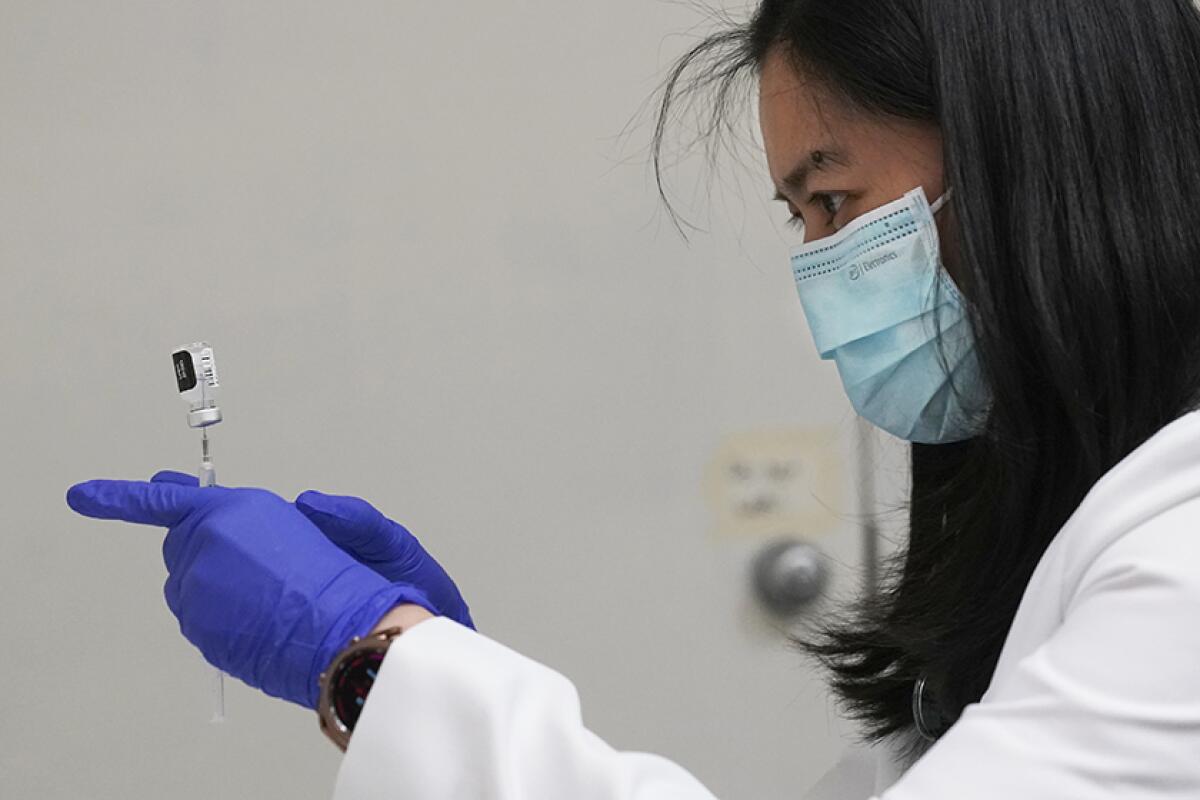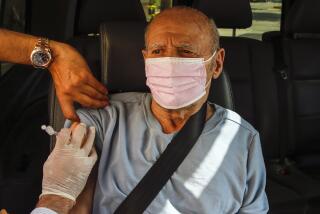California counties sidestep direct Blue Shield oversight in new vaccine deal

- Share via
SACRAMENTO — California counties that have refused to sign on to the state’s new COVID-19 vaccine program run by Blue Shield of California are expected to instead reach a separate agreement with the state to end a stalemate that threatened to slow delivery of shots.
Blue Shield President Paul Markovich said Friday that counties were concerned about signing the vaccine distribution contract with a private company, which had been a requirement for all vaccine providers that wanted to continue receiving doses in California under the new program. A spokesperson for the California Department of Public Health confirmed the change.
“They’re much more comfortable with an agreement with the state, which is fine by us as long as there’s agreement that they will participate in the performance management system that allows us to deliver on the performance in our contract,” Markovich said in a call with reporters Friday. “It should be just fine.”
Markovich said the deal between the state and counties is expected to be finalized soon to “avoid disruption.”
The memorandum of understanding sent to counties, which was obtained by The Times, indicates that compliance with the contract is required for “continued eligibility for allocation of COVID-19 vaccine.” The state’s terms include that a county can’t redistribute its doses to other providers and that the county “will reasonably cooperate” with Blue Shield when it is acting on behalf of the state.
It’s uncertain how many counties that refused Blue Shield’s contract will sign with the state, with at least one county saying it will not sign either agreement.
Counties have been locked in a weeks-long stalemate with the state and Blue Shield over California’s decision to hand over vaccine delivery decisions to the private insurance company. Los Angeles County officials were the latest to ask for the ability to opt out of the Blue Shield contract, highlighting concerns with the outsourced oversight of distribution.
As of Friday, only Kern County had signed a contract with Blue Shield, and Markovich said he expected other counties to sign directly with the state.
Markovich said the change would not affect vaccine allocation decisions in which the state sets priorities on which the insurance company bases its algorithm to determine where to send doses. Under the revamped vaccine program run by Blue Shield, allocations are also made based on how effective vaccine providers are at administering shots.
That setup bypasses the state’s previous system in which the state decided how much vaccine each county would receive, but the counties controlled where doses were sent locally.
“The state, as part of the transition to a system where the state directly allocates vaccines to specific providers, is working with counties to finalize language to memorialize their continued role as vaccine providers,” said Darrel Ng, a communications advisor for California’s COVID-19 Vaccine Task Force. “We look forward to continue working with counties to equitably and efficiently vaccinate Californians.”
Gov. Gavin Newsom announced the significant changes to California’s vaccine delivery system in January after widespread criticism that the state was too slow in its rollout of inoculations. The Newsom administration tapped Blue Shield as the independent overseer of California’s network of COVID-19 vaccine providers, with the governor saying the private insurer would streamline the state’s fragmented system and create “more efficient distribution, speed, and equity and transparency with vaccines.”
As of Friday, 92 vaccine providers had signed the contract with Blue Shield to operate more than 1,300 vaccine sites across the state, according to the insurance company.
The state signed a separate deal with Kaiser Permanente, allowing the healthcare system to oversee its own distribution of doses at additional vaccine sites independent of Blue Shield’s oversight.
It’s unclear what will happen if a county refuses to sign the Blue Shield contract or memorandum of understanding with the state, but it could result in local public health agencies in those areas being cut off from future vaccine allocations. In that case, vaccines would still be available in the county through other providers, such as pharmacies, hospitals or clinics that have signed the contract with Blue Shield.
Blue Shield is scheduled to take full management responsibility for the statewide network by March 31. In the meantime, counties will continue to receive vaccine, whether or not they have signed agreements with the state or Blue Shield.
Newsom characterized some of the pushback from counties as a natural aversion to change, but local government officials have said that making changes midstream will cause upheaval in the vaccine distribution system.
“I think all of the counties feel at this point like they have really strong public health departments that have a lot of experience and knowledge around setting up and executing vaccination programs,” Los Angeles County Public Health Director Barbara Ferrer said Tuesday.
Los Angeles County Board of Supervisors Chair Hilda Solis and Chair Pro Tem Holly Mitchell asked that the county be exempted from Blue Shield’s oversight in a March 2 letter to Newsom. They wrote that Blue Shield officials “have not demonstrated they have an adequate understanding of the unique needs and features of Los Angeles County, its diverse population, and where our residents go for health care.”
On Friday, a Santa Clara County official said the county will not sign a contract directly with Blue Shield and does not plan to sign the agreement with the state as it stands now.
County Executive Jeff Smith said the state’s agreement doesn’t address the key concerns Santa Clara County has about the state and Blue Shield deciding where the vaccine should go in its communities. Smith said the county has communicated with the state about what kind of conditions officials there would agree to.
“We are quite confident that Blue Shield doesn’t know what is needed in every community in the state,” Smith said. “We have created a large network and a very effective reporting system so everyone knows where the doses have gone.”
Ventura County previously asked the state for the ability to opt out of the new system as well.
Barry Zimmerman, chief deputy director for the county’s Health Care Agency, said state and Blue Shield officials told Ventura County that opting out entirely was not an option. In addition, the San Joaquin County Board of Supervisors requested that the county’s counsel explore options for opting out of the “tremendous bureaucratic system” supervisors said would be implemented under Blue Shield.
The contract with Blue Shield has caused concerns since it was first sent to vaccine providers. The University of California Health system said the initial contract with Blue Shield sought an expansive amount of medical data. The system signed the contract after changes were made.
The state is requiring counties to use its My Turn appointment system, which has been beset by complaints of glitches and compatibility issues in the last two weeks.
Critics of the scheduling system have complained that it is unable to reserve vaccine appointments for people living in underserved communities, one of the key components of the state’s efforts to ensure doses are being distributed equitably. Vaccine providers have said that it would create unnecessary additional work by requiring information to be entered twice — into their own systems and My Turn. Others have said that an online appointment system does not work for reaching some key hard-hit communities and groups, such as agriculture workers.
The state has continued to push the system, saying that 1 million appointments set with My Turn have been completed in seven weeks and that the site will increasingly play a key role in California’s focus on ensuring vaccine equity.
Markovich said Friday that more than half of the county health agencies are using My Turn or will be in less than a week.
More to Read
Sign up for Essential California
The most important California stories and recommendations in your inbox every morning.
You may occasionally receive promotional content from the Los Angeles Times.











